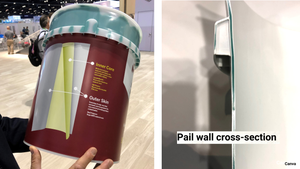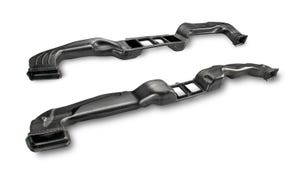Plastics can help make Trump’s infrastructure plan truly great
Those “gleaming new roads” that the President wants to build “across our land?” I have just one word: Plastics.
January 31, 2018

The plastics industry has a constructive role to play in the infrastructure plan mentioned by President Trump in his State of the Union speech last night, a point made by William Carteaux, President and CEO of the PLASTICS Industry Association (PLASTICS; Washington, DC).
“Plastic materials and products should be allowed to compete on a level playing field for the improvement projects that will eventually form the president’s infrastructure plan,” said Carteaux in a statement issued following the address. “Plastic materials can perform as well, or better, than more traditional materials, and often at a fraction of the cost to the American taxpayer.”
Living in the Los Angeles area, I confess that I am as concerned with the state of our roads as I am of the state of the union, and Carteaux's statement reminded me of a project in the Netherlands that has some relevance.
Those “gleaming new roads” that the President wants to build “across our land?” I have just one word for him: Plastics. Back in 2015, I wrote about a pilot project in Rotterdam that would pave new roads with recycled plastic bottles. There are numerous advantages to replacing asphalt with plastic, according to Dutch construction firm VolkerWessels (Amersfoort) , which is spearheading the project: Reduced maintenance, increased temperature resistance and accelerated road laying, which would take weeks instead of months. The surface lasts three times longer than asphalt, adds the company, and it is lighter and hollow, making it easier to install cables and pipelines below the surface.
The sections can be prefabricated in a factory and transported to the construction site, shortening construction time and reducing congestion caused by roadwork.
|
The PlasticRoad consortium claims that its roadways last three times longer than conventional paved roads and reduce construction time by as much as 70%. Image courtesy PlasticRoad. |
Since we published that article, VolkerWessels has teamed up with recycler Wavin, which has its headquarters in Zwolle, Netherlands, and French petrochemicals company Total (Courbevoie) to form PlasticRoad, a consortium that is developing a business case and building a prototype of the road of the future.
Yes, this is not shovel-ready and would require R&D resources, but the technology has immense potential and helps to solve several problems in one fell swoop. Worth a look, no?
In his statement, Carteaux also urged policymakers not to overlook the nation’s recycling facilities when it comes to upgrades. “This push to rebuild our nation’s infrastructure presents a unique opportunity to increase the amount of plastic our country recycles and to facilitate growth in the market. A national effort to upgrade these facilities would both support business and employment growth in recycled plastics while simultaneously reducing waste.”
Hitting on another theme of the State of the Union address, Carteaux said that the plastics industry shared the president’s support for strong, mutually beneficial trade agreements. “The North American plastics industry has been in lockstep when it comes to enhancing the benefits of the North American Free Trade Agreement (NAFTA) and we look forward to working with the administration and Congress to ensure that this and other trade agreements are as strong as they can possibly be.”
It should be noted, however, that as recently as earlier this month in Davos, Switzerland, Trump told CBS News: “I may terminate NAFTA. I may not. We’ll see what happens.” Pulling out of NAFTA would be consequential for the U.S. plastics industry, which “ran a surplus of $10.7 billion with Mexico and $719 million with Canada in 2016,” said Carteaux during a December 2017 webcast. “That would not have been possible without NAFTA,” he added.
About the Author(s)
You May Also Like





